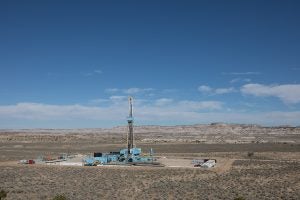To tackle natural gas waste on federal and tribal lands, the Biden administration must end routine venting and flaring
 By Jon Goldstein and Ben Tettlebaum
By Jon Goldstein and Ben Tettlebaum
With responsibility over one-eighth of the nation’s landmass, the Bureau of Land Management has a lot of important jobs. Chief among them is ensuring federal and tribal lands — and the minerals beneath them — are wisely and responsibly managed on behalf of the public, including U.S. taxpayers and tribal citizens.
But avoidable venting and flaring of natural gas from these lands emit harmful pollutants that have significant public health impacts, especially on communities living near oil and gas fields. What’s more, this damaging practice severely exacerbates the climate crisis and, estimates show, wastes $400 million worth of gas every year.
That’s why a broad coalition of 65 environmental, conservation, tribal, business, faith and agricultural groups called on BLM in a letter late last month to follow the lead of states like Alaska, Colorado and New Mexico and ban routine venting and flaring of natural gas.
Harming communities and climate, while letting taxpayers pick up the tab
Venting (intentionally releasing natural gas to the atmosphere) and flaring (burning it off at the wellsite) help no one and carry a hefty price tag for all of us. Not only do these avoidable practices waste energy resources, but they also degrade local air quality and undercut public health. Health risks increase the closer people live, work, and attend school near oil and gas facilities. And since natural gas is primarily methane, a greenhouse gas 80 times more powerful than carbon dioxide in the near term, this pollution causes alarming damage to the climate.
To tackle natural gas waste on federal and tribal lands, the Biden administration must end routine venting and flaring Share on XStopping this hyper-potent climate pollution is essential for cutting methane emissions in line with commitments under the Global Methane Pledge , and protecting communities and public lands across the West that are already witnessing the impacts of a changing climate firsthand.
The $400 million waste problem also means that every year $50 million in federal revenue is lost, funds that are sorely needed for infrastructure investments and other priorities across the West, including on tribal lands. This wasted gas represents enough lost fuel to meet the annual needs of 2.1 million households (almost as many as all those in New Mexico, North Dakota, Utah and Wyoming combined).
Banning venting and flaring would bring clear financial and energy benefits, accompanied by substantial co-benefits to climate and public health. It’s just common sense.
BLM has the opportunity to enact meaningful solutions
In 2016, BLM acted to curtail methane waste, an effort that — despite bipartisan congressional support — the Trump administration opposed at every turn. Now, the Biden administration has rightly set a course to return to rules that ensure all of us are protected from the waste of our energy resources. Getting these rules right and including a ban on routine venting and flaring will be critical to ensuring we address this waste problem and meet the methane moment.
Oil and gas states ranging from Alaska to Colorado to New Mexico are already leading the way on this issue and showing that best practices to cut waste are workable and cost-effective. We need BLM to build on their example, and new analysis from energy research firm Rystad drives home the fact that solutions to end routine flaring are not only widely available, but also overwhelmingly cost-effective and in many cases profitable.
Ending routine venting and flaring on federal and tribal lands is critical for stopping waste while protecting public health and meeting climate goals. EDF and The Wilderness Society will remain engaged to ensure BLM bans this wasteful practice as the agency moves toward a rule proposal this spring.
Ben Tettlebaum is a senior staff attorney at The Wilderness Society










